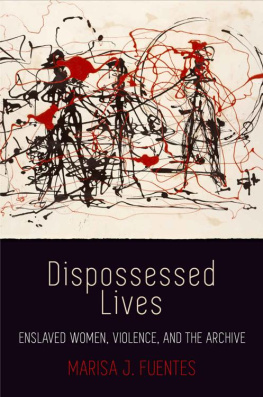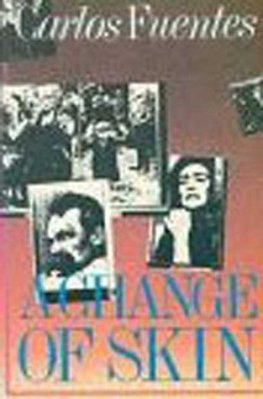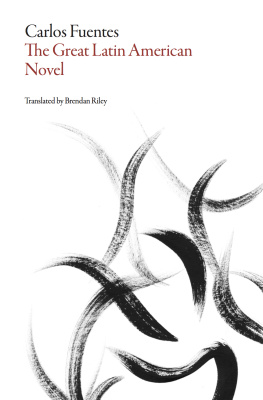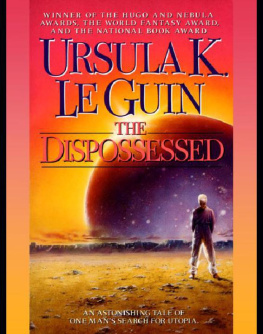Marisa J. Fuentes - Dispossessed Lives (Early American Studies)
Here you can read online Marisa J. Fuentes - Dispossessed Lives (Early American Studies) full text of the book (entire story) in english for free. Download pdf and epub, get meaning, cover and reviews about this ebook. year: 2016, publisher: University of Pennsylvania Press, Inc., genre: Romance novel. Description of the work, (preface) as well as reviews are available. Best literature library LitArk.com created for fans of good reading and offers a wide selection of genres:
Romance novel
Science fiction
Adventure
Detective
Science
History
Home and family
Prose
Art
Politics
Computer
Non-fiction
Religion
Business
Children
Humor
Choose a favorite category and find really read worthwhile books. Enjoy immersion in the world of imagination, feel the emotions of the characters or learn something new for yourself, make an fascinating discovery.
- Book:Dispossessed Lives (Early American Studies)
- Author:
- Publisher:University of Pennsylvania Press, Inc.
- Genre:
- Year:2016
- Rating:5 / 5
- Favourites:Add to favourites
- Your mark:
- 100
- 1
- 2
- 3
- 4
- 5
Dispossessed Lives (Early American Studies): summary, description and annotation
We offer to read an annotation, description, summary or preface (depends on what the author of the book "Dispossessed Lives (Early American Studies)" wrote himself). If you haven't found the necessary information about the book — write in the comments, we will try to find it.
Dispossessed Lives (Early American Studies) — read online for free the complete book (whole text) full work
Below is the text of the book, divided by pages. System saving the place of the last page read, allows you to conveniently read the book "Dispossessed Lives (Early American Studies)" online for free, without having to search again every time where you left off. Put a bookmark, and you can go to the page where you finished reading at any time.
Font size:
Interval:
Bookmark:
DISPOSSESSED LIVES
EARLY AMERICAN STUDIES
Series editors:
Daniel K. Richter, Kathleen M. Brown,
Max Cavitch, and David Waldstreicher
Exploring neglected aspects of our colonial, revolutionary, and early national history and culture, Early American Studies reinterprets familiar themes and events in fresh ways. Interdisciplinary in character, and with a special emphasis on the period from about 1600 to 1850, the series is published in partnership with the McNeil Center for Early American Studies.
A complete list of books in the series is available from the publisher.
DISPOSSESSED LIVES

Enslaved Women, Violence, and the Archive
Marisa J. Fuentes

UNIVERSITY OF PENNSYLVANIA PRESS
PHILADELPHIA
Copyright 2016 University of Pennsylvania Press
All rights reserved. Except for brief quotations used for purposes of review or scholarly citation, none of this book may be reproduced in any form by any means without written permission from the publisher.
Published by
University of Pennsylvania Press
Philadelphia, Pennsylvania 19104-4112
www.upenn.edu/pennpress
Printed in the United States of America on acid-free paper
1 3 5 7 9 10 8 6 4 2
Library of Congress Cataloging-in-Publication Data
ISBN 978-0-8122-4822-7
For my dad, Jose de Jesus Fuentes and Ula Y. Taylor,
for all that you have given me.
CONTENTS


The Caribbean

Barbados
Introduction
Dispossessed Lives constructs historical accounts of urban Caribbean slavery from the positions and perspectives of enslaved women within the traditional archive. It does so by engaging archival sources with black feminist epistemologies, critical studies of archival power and form, and historiographical debates in slavery studies on agency and resistance. To trace the distortions of enslaved womens lives inherent in the archive, this book raises questions about the nature of history and the difficulties in narrating ephemeral archival presences by dwelling on the fragmentary, disfigured bodies of enslaved women. How do we narrate the fleeting glimpses of enslaved subjects in the archives and meet the disciplinary demands of history that requires us to construct unbiased accounts from these very documents? How do we construct a coherent historical accounting out of that which defies coherence and representability? How do we critically confront or reproduce these accounts to open up possibilities for historicizing, mourning, remembering, and listening to the condition of enslaved women?
This study probes the constructions of race, gender, and sexuality, the machinations of archival power, and the complexities of agency in the lives of enslaved and free(d) women in colonial Bridgetown, Barbados. A micro-history of urban Caribbean slavery, it explores the significance of an urban slave society that was numerically dominated by women, white and black. By the turn of the eighteenth century, Barbados sustained an enslaved female majority whose reproduction rates contributed to a natural increase in the slave population by 1800. This unusual demography and the underexplored, intra-gendered relationships between different groups of women mark an important shift from the extant scholarly focus on white mens domination of black and brown women in slave societies.
Despite its small size in relation to other Caribbean islands, an examination of Barbados, and in particular Bridgetown, enhances our understanding of how race, gender, and sexuality were formed in British Atlantic slave societies and how these constructions of identity directed and influenced the life experiences of urban enslaved women. Unlike similar works on enslaved women of the antebellum U.S. South that draw on the limited voices of the enslaved, this book does not feature sources written by enslaved people themselves. It articulates the forces of power that bore down on enslaved women, who sometimes survived in ways not typically heroic, and who sometimes succumbed to the violence inflicted on them. Each chapter examines one woman in the context of eighteenth-century Bridgetown as she came into archival view. The chapters are titled after the women who are named in the fragments I explore when possible, in order to contest their fragmentation and to challenge the impetus of colonial authorities to objectify enslaved people in the records by generic namings such as Negro or slave.

Figure 1. Prospect of Bridgetown in Barbados, by Samuel Copen (London, 1695). Courtesy of the Barbados Museum and Historical Society.
Dispossessed Lives sets out to answer several questions pertaining to enslaved women in the urban Caribbean. How did these women negotiate physical and sexual violence, colonial power, and the demands of their female owners in the eighteenth century? In what ways did urban enslavement differ from the plantation complex? How was freedom defined in this slave society? How did architectures and symbols of terrorsuch as the Cage that held runaway slaves, and the execution gallowsshape how enslaved women were confined and controlled in an urban context? And finally, what do the archival fragments describing enslaved women alternately uncover and refuse to reveal about their racial, gendered, and sexual experiences as enslaved subjects?
In answering these questions this book thematically illustrates the connections between gender, urban space, and enslavement. , I bring attention to the excessive images of violence on enslaved female bodies that emerge in the debates to abolish the slave trade and contemplate the aurality of pain as a way to consider the rhetorical demands of otherwise anonymous historical subjects.
Over two decades of scholarship on the social histories of gender and slavery and theoretical work on the politics of the archive serve as the foundation for this books emphasis on historical production and the archives of enslaved women in Caribbean slavery. These social histories of enslaved womens everyday lives allow me to focus specific attention on the questions of archival fragmentation and historicity without reproducing their labors on the historical, social, and economic circumstances of slavery in the Atlantic world. Driven by questions of historical production in the context of archives that are partial, incomplete, and structured by privileges of class, race, and gender, my work follows the path-breaking scholarship of Deborah Gray White, Jennifer Morgan, Camilla Townsend, and Natalie Zemon Davis, who found ingenious ways to use known biases within particular archives to ask seemingly impossible questions of subjects whose presence, when noted, is systematically distorted. Scholars in the fields of colonial slavery and womens history more broadly understand and contend with scant sources from the enslaved perspective, and this is particularly true in the colonial British Caribbean.
This study also draws attention to the nature of the archives that inform historical works on slavery by employing a methodology that purposely subverts the overdetermining power of colonial discourses. By changing the perspective of a documents author to that of an enslaved subject, questioning the archives veracity and filling out miniscule fragmentary mentions or the absence of evidence with spatial and historical context our historical interpretation shifts to the enslaved viewpoint in important ways. As previous scholarship has generated substantial knowledge about how enslaved women made meaning in their lives despite commodification and domination, my book does not simply seek to recover enslaved female subjects from historical obscurity. Instead, it makes plain the manner in which the violent systems and structures of white supremacy produced devastating images of enslaved female personhood, and how these pervade the archive and govern what can be known about them. Rather than leaving enslaved women vulnerable to the readings and misreadings of whoever chooses to make assumptions about them, my book probes the construction of enslaved women in the archival records, using methods that at once subvert and illuminate biases in these accounts in order to map a range of life conditions that profoundly challenge assumptions about the slave experience in Caribbean systems of domination.
Next pageFont size:
Interval:
Bookmark:
Similar books «Dispossessed Lives (Early American Studies)»
Look at similar books to Dispossessed Lives (Early American Studies). We have selected literature similar in name and meaning in the hope of providing readers with more options to find new, interesting, not yet read works.
Discussion, reviews of the book Dispossessed Lives (Early American Studies) and just readers' own opinions. Leave your comments, write what you think about the work, its meaning or the main characters. Specify what exactly you liked and what you didn't like, and why you think so.












